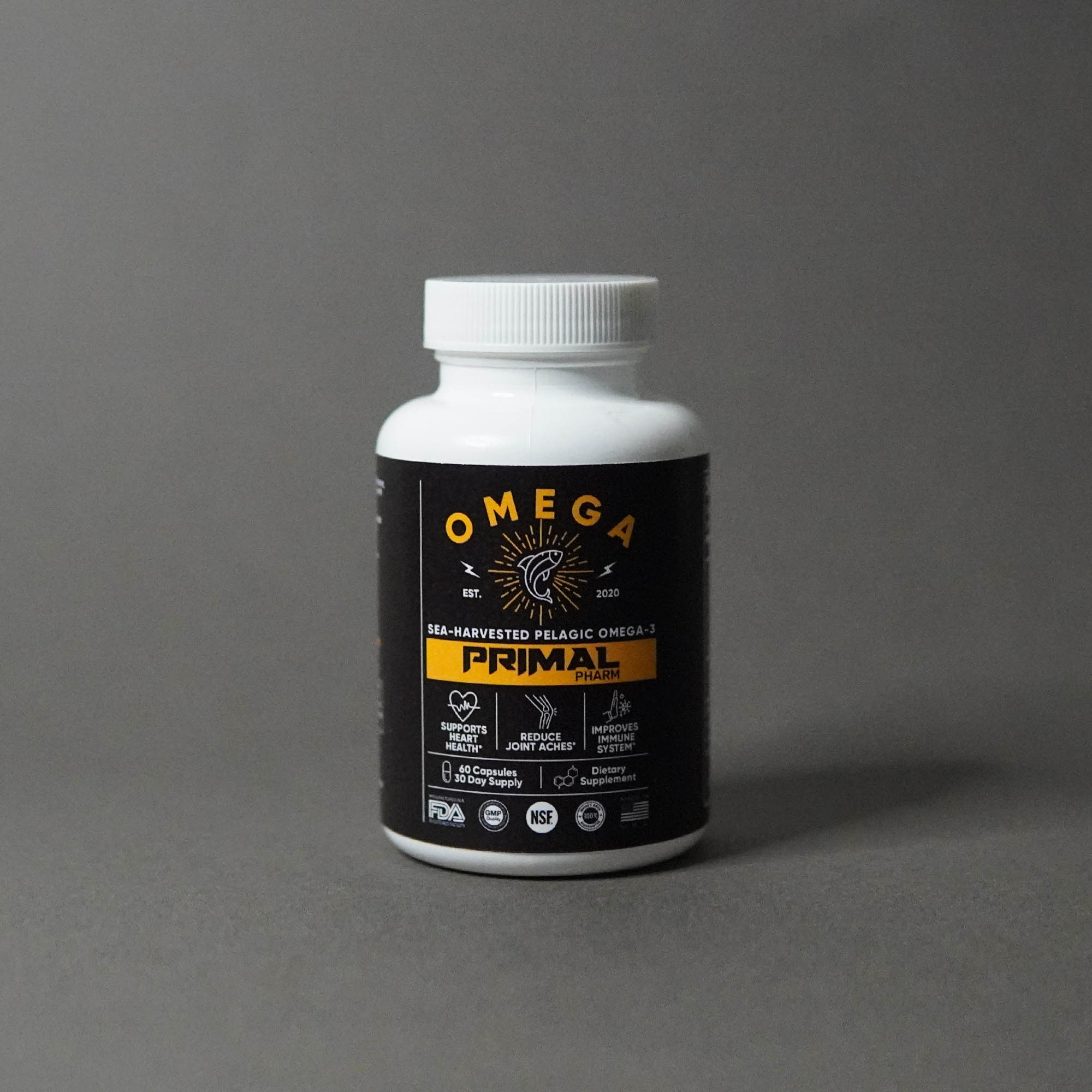Join our newsletter
Sign up for exclusive updates, new arrivals & insider-only discounts





Couldn't load pickup availability
OMEGA® is formulated to help maintain healthy heart, brain, skin & eye health utilizing the active ingredients of Omega 3 Fatty Acids from Sea Harvested Pelagic Fish.
The main omega-3s in fish oil are eicosapentaenoic acid (EPA) and docosahexaenoic acid (DHA), while the omega-3 in plant sources is mainly alpha-linolenic acid (ALA). Although ALA is an essential fatty acid, EPA and DHA have many more health benefits (5).
EPA and DHA have been shown to improve your heart health, treat mental disorders including depression, aid weight loss, support skin & eye health, reduce inflammation, improve attention and hyperactivity, relieve asthma and allergy symptoms, plus countless other benefits (1,2,3,4,6,7,8).
It is important to get enough omega-3s because the Western diet has replaced a lot of omega-3s with other fats like omega-6s (9). This distorted ratio of fatty acids has contributed to numerous diseases (9).
Omega-3 supplements can significantly lower blood triglycerides which help in reducing cholesterol and preventing cardiovascular events like heart attacks (1).
Helps maintain skin health by promoting hydration and healthy skin barrier function* (3).
EPA & DHA are vital for the maintenance of normal brain function throughout life (2). They are abundant in the cell membranes of brain cells, preserving cell membrane health and facilitating communication between brain cells (2).
Omega-3s can reduce inflammation and symptoms of various autoimmune diseases, such as rheumatoid arthritis (13). They’re also effective at reducing menstrual pain (14).
The fish oil in Primal Pharm's OMEGA® is derived from the tissues of sea harvested pelagic fish containing omega-3 fatty acids plus natural lemon flavor to help improve taste.
OMEGA® contains many omega-3 fatty acids, however the two most important for your health, as recommended by the World Health Organization (WHO), are EPA and DHA fatty acids (5). OMEGA® contains the perfect ratio of both of these fatty acids to support overall health and immune system function (10).
Eicosapentaenoic acid (EPA) has many essential functions. Most importantly, it’s used to form signaling molecules called eicosanoids which can reduce inflammation (1). Alternatively, EPA has been shown to reduce your risk of chronic diseases, such as heart disease and is particularly effective against certain mental conditions, especially depression (1,2,5).
Docosahexaenic acid (DHA) is a primary structural component of the human brain, cerebral cortex, skin, and retina (11). It helps reduce the risk of sudden heart-related death, increase blood flow during mental tasks, decrease in attention problems, fights inflammation, reduces muscle soreness, improves range of motion, decreases glaucoma risk, supports blood circulation and more (1,2,12).
Suggested Use: As a dietary supplement, take one (1) softgel, 2 - 3 times daily with meals.
CAUTION: Do not exceed recommended dose. Pregnant or nursing mothers, children under the age of 18, and individuals with a known medical condition should consult a physician before using this or any dietary supplement.
Sign up for exclusive updates, new arrivals & insider-only discounts
Thanks for subscribing!
This email has been registered!
2 weeks in and I’ve notice a huge difference. I really do enjoy this product. It’s so convenient to have one drink that has everything that you want!
This product helps with concentration and mental fatigue. It also gets you in a better mood to tackle the day.
This is a wonderful probiotic. It is the only one that I have found that works so I have rated it with five stars.
I highly recommend the recovery stack for everyone: athlete or hobbyist. The ingredients are natural and good for your body no matter what. Often times also supplements what are body is really missing when we live busy lifestyles!
I've been using SHROOM for 2 years, and it's my all-time favorite supplement. Keeps me going through long rough game.
Absolutely love it . I take it before jiu jitsu to give me that extra gear , and I don't like the feeling pre workouts give me but SHROOM gives me the energy I need without the stimulant feeling . Wether it's jiu jitsu or I have a large job that needs to be done in one day ( I'm an electrician for a solar company ) I can count on SHROOM to give me that extra edge I need .I recommend it to everyone
Definitely a noticeable gain in workout volume. I use it in concert with another supplement that I take regularly, and it's a perfect match.
So far so good feel it only took a couple of days but we continue and see